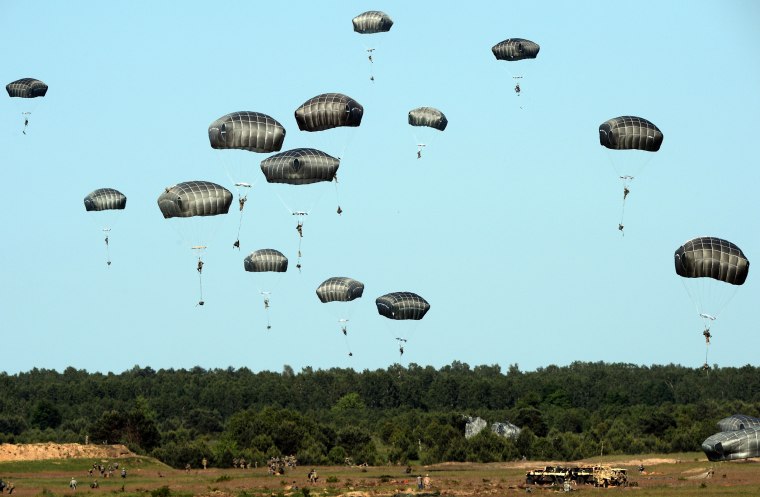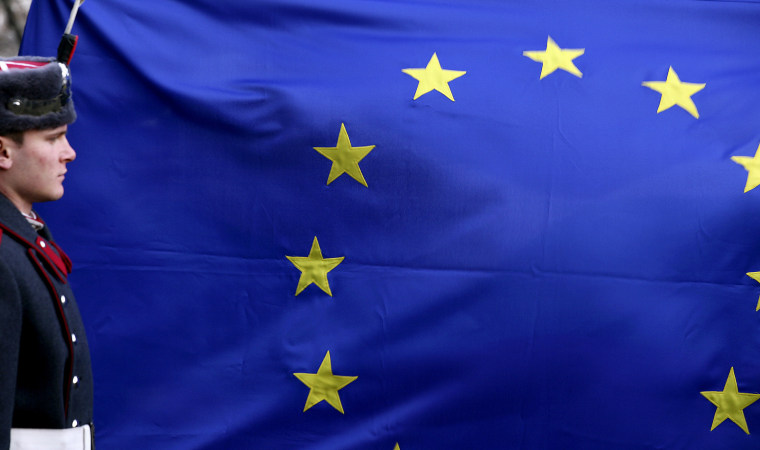LONDON — European nations are pressing ahead with plans for joint defenses and military cooperation, raising fears that U.S.-led NATO could be undermined.
With Britain poised to quit the European Union and Donald Trump raising doubts over NATO, France and Germany have been spearheading moves to boost Europe's capacity to run its own security operations.

Joint development of assets such as helicopters and drones, stronger defenses against state-sponsored computer hackers and the expansion of peace-keeping abroad were among the proposals unveiled last week at a conference of European ministers.
The plans, which could be green-lighted as early as December, come after EU President Jean-Claude Juncker called for the construction of a new EU military headquarters that would eventually control a joint EU army comprised of troops from member states.
A common military force would be “in complement to NATO,” he insisted in a speech last month, adding: "More defense in Europe doesn't mean less transatlantic solidarity.”
Related: Trump's NATO Rethink Would 'Endanger the Whole Alliance'
However, Britain vehemently opposes the plans and fears they could suck resources away from NATO.
"We're going to oppose any idea of an EU army or an EU army headquarters, which would simply undermine NATO," British Defense Secretary Michael Fallon said last week.
"There are member states who would like to see...a single set of forces. That looks and sounds to me like a European army, and we would oppose that," he told reporters. "Europe is littered with headquarters, what we don't need is another one."
All but six of the 28 EU nations are also members of NATO, and most contribute to NATO rapid-reaction forces— but Britain, the most effective European military force, earlier this year voted to quit the EU in the so-called "Brexit" referendum.
France and Germany had hoped that Brexit would weaken London’s opposition to common defense plans. Instead, it seems to have thrown a spotlight on NATO, which is already rattled by Donald Trump’s suggestion that he might not honor the core treaty obligations of the alliance if he was elected.
In the first presidential debate, Trump appeared to soften his position, saying he was “all for NATO,” before adding: “I said they have to focus on terror, also. And they're going to do that. And that was, believe me, not going to get credit for it, but that was largely because of what I was saying and my criticism of NATO.”
European leaders might have recalled the leaked conversation in 2014 between Assistant Secretary of State Victoria Nuland and U.S. Ambassador to Ukraine Geoffrey Pyatt in which she remarked: “F*** the EU.”
But experts believe the U.S. shouldn’t fear NATO weakening anytime soon, and see the EU army plans as a natural response to uncertainty across its own continent rather than worries over the White House.
“With the refugee crisis, the mess in the Eurozone, Brexit and so on, something needed to be done to demonstrate the continued importance of the European project and security was the issue most immediately at hand,” said Ivo Daalder, pesident of the Chicago Council on Global Affairs think tank and a former U.S. ambassador to NATO.
“That was the logic behind it. The other factor here is that this is the first time a U.S. presidential candidate has put serious questions behind its commitment to the [NATO] alliance in the 67 years of its existence,” he added: “They are hedging … it’s the natural thing to do.”
At last week’s meeting of defense ministers in Bratislava, EU foreign policy chief Federica Mogherini said there was "nothing ideological" about the plans and said the attendance of NATO Secretary-General Jens Stoltenberg was a sign that the EU and NATO are still working closely together.
German Defense Minister Ursula von der Leyen echoed that, saying: “It’s not about a European army. On the contrary, it is about bundling the various strengths of European countries to be ready to act together quickly."

French Defense Minister Jean-Yves Le Drian said there was a "need to boost European capacity" for EU operations, citing how Europe had struggled to coordinate support during the 2014 Ebola epidemic in West Africa. In 2011, the British and French air campaign in Libya also showed Europe's limits, as the operation quickly became reliant on a NATO-led operation including the United States, Canada and Norway for refueling planes, logistics and military know-how.
Finland, meanwhile, has offered to host an EU cyber-defense academy to tackle online crime and ‘hybrid warfare’— the emerging mix of misinformation and military might favored by Moscow.
“I think there’s evidence that Europe has a requirement for a more civilian mission-oriented headquarters,” said John Deni, research professor of National Security Studies at the Strategic Studies Institute, part of the U.S. Army War College.
Any plans that added capacity to Europe’s military machine would be viewed in Washington as “a good thing,” he said, but there could be concerns about “potential for duplication in terms of military command.”
“It strikes many people on the U.S. side of the Atlantic Europeans have limited defense euros to spend and it might be better to focus on actual capability rather than on another operational headquarters,” he said.
He added that he could see no evidence of “a lessening of the importance of NATO on both sides of the Atlantic … in fact it seems to me the alliance is more important than ever right now and we can thank [Russian President Vladimir] Putin for much of that.”
Related: U.S. Infuriates Russia by Sending Tanks Within Miles of Border
Daalder, the former U.S. ambassador, said America shouldn’t fear the latest EU plans because “it would take years if not decades to resolve internal differences.”
However, more layers of command could potentially distract from focus on NATO.
“The U.S. isn’t worried about a strong Europe, it would be worried about a weak Europe,” he said. “Diverting energy away from defense to operations would be a bad thing … the focus should be on improving military capacity rather than command.”
Jonathan Eyal, an associate director and Royal United Services Institute think tank in London, dismissed the significance of the EU plans.
“Can you name which conflict the EU wanted to be involved with but didn’t because it didn’t have a command headquarters?” he asked. “Is there an example of a time when the Americans did not allow the Europeans to go fighting? A lot of this army plan is in the realm of make-believe.”
He said the motivation for the plans was “a desperate search for something to do … a project that will display the idea somehow that this EU is not about to be dismembered [by Brexit].”
“This is not a Europe looking to the future,” he said. “A shiny new building with a shiny new complement of officials is a very big waste of cash but there’s nothing inherently anti-NATO, it’s just a solution in search of a problem.”
